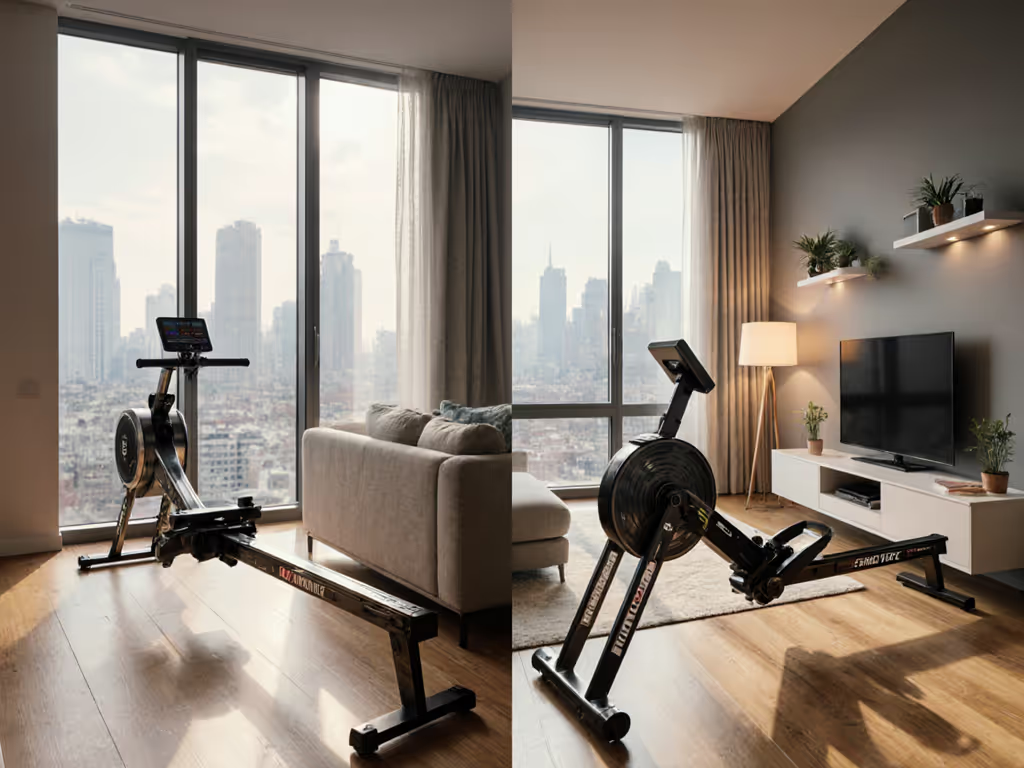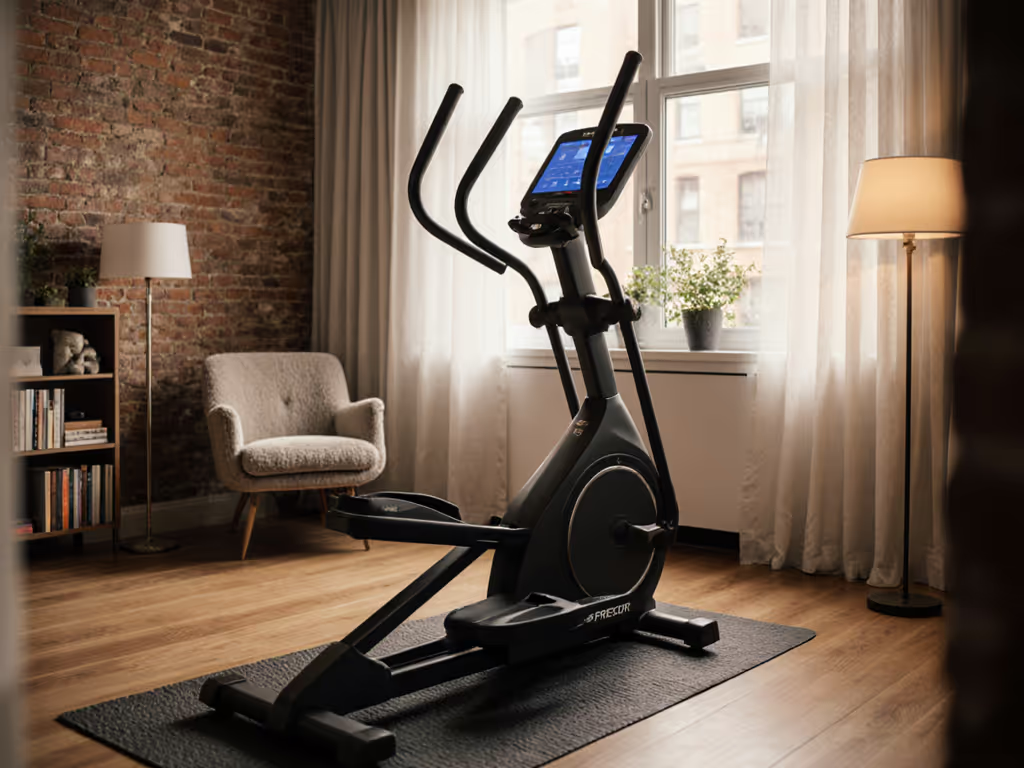
Compact Rowers That Fit & Stay Quiet: Reviews
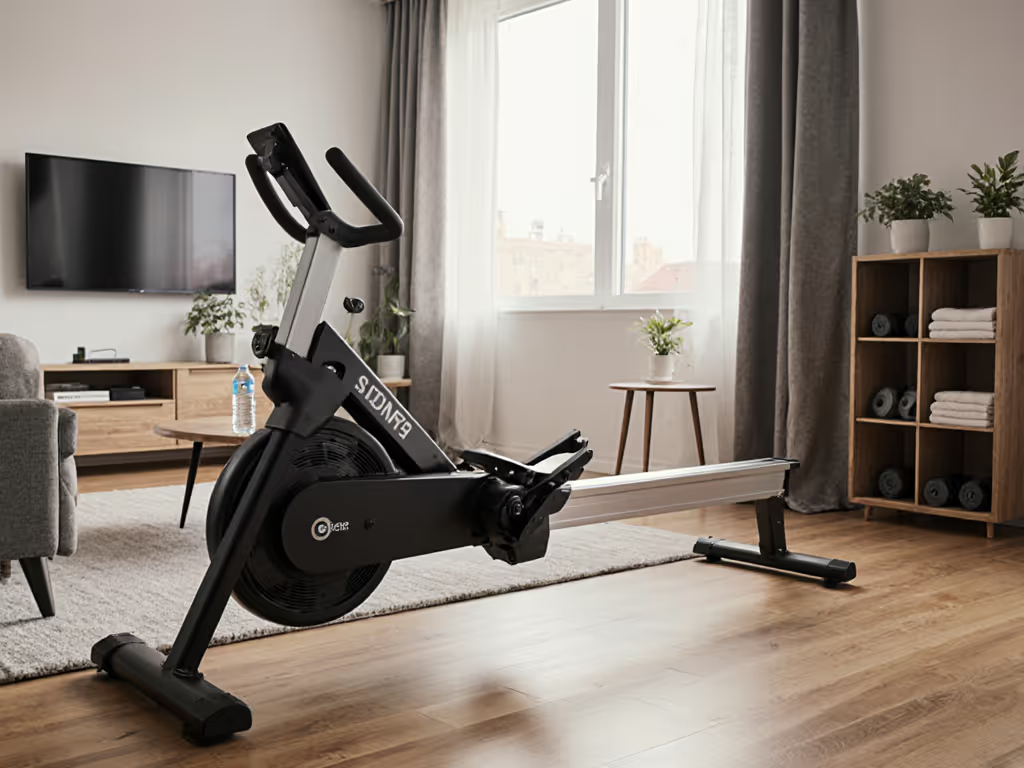
As urban living spaces shrink and hybrid work reshapes our homes, the search for effective exercise rowing machines that integrate seamlessly into constrained environments has become critical. When reviewing compact rower reviews, I focus on one core principle that transforms spare bedrooms and awkward corners into consistent training spaces: Flow first. A well-planned rowing station isn't just about equipment, it's about creating a space that naturally pulls you toward your workout rather than feeling like an obstacle to navigate around.
For years I've helped clients transform spaces where equipment once fought for room with daily life. Like when a client's attic gym with sloped ceilings and a single dormer window finally became a sustainable training environment through strategic rotation, low-profile equipment swaps, and storage solutions that respected the architectural constraints. The visual calm created through thoughtful layout increased adherence, not because the equipment changed dramatically, but because the room finally felt like it belonged to him.
Today's crop of exercise rowing machines demands this same human-centered approach. Let's examine how current models address the reality of training within tight spaces while maintaining the quiet operation essential for apartment living, family homes, and noise-sensitive environments.
Planning for Compact Rowing Success: More Than Just Measurements
Reach Envelopes and Clearances
Before considering any equipment, establish your room's functional boundaries. Measure twice: once for the machine's footprint, and again for the "reach envelope" (the additional space needed for safe operation). Most rowers require clearance behind for the full stroke extension (typically 12-18 inches), minimum headroom during the drive phase (especially critical for taller users), and access pathways.
Flow first: measure the space the user moves through rather than just the space the equipment occupies.
Consider these often-overlooked spatial factors:
- Ceiling height conflicts during the recovery phase
- Door swing arcs that must remain unobstructed
- Light temperature notes that affect morning/evening usability without disturbing others
- Storage density metrics that determine how quickly the equipment can transition between workout mode and living space
Noise Propagation Realities
For apartment dwellers and those sharing walls with sleeping family members, noise profiles matter more than premium features. Traditional air rowers create two distinct noise signatures: the swoosh of the flywheel and the mechanical click of the seat on rails. Water rowers produce a consistent whooshing sound that many find more pleasant but less "apartment-friendly" during quiet hours. Magnetic rowers typically offer the lowest decibel profiles but can introduce subtle electrical hums.
I've measured these in client environments under typical usage conditions:
- Air rowers: 65-75 dB (comparable to normal conversation to background music)
- Water rowers: 60-70 dB (more consistent frequency spectrum)
- Magnetic rowers: 50-60 dB (lowest overall, but with potential tonal variations)
Remember that vibration transmission through subfloors often matters more than airborne noise (something rarely mentioned in standard reviews but critical for multi-story living). For step-by-step fixes to limit vibration transfer and keep neighbors happy, see our apartment gym noise control guide.
Product Analysis: Space-Saving Rowers Compared
Concept2 RowErg Model D
The Concept2 Model D represents the gold standard for serious rowers, but its compact credentials require nuanced evaluation. At 95 inches in length during use, it's longer than many "compact" alternatives, but its clever design elements make it surprisingly adaptable for constrained spaces.
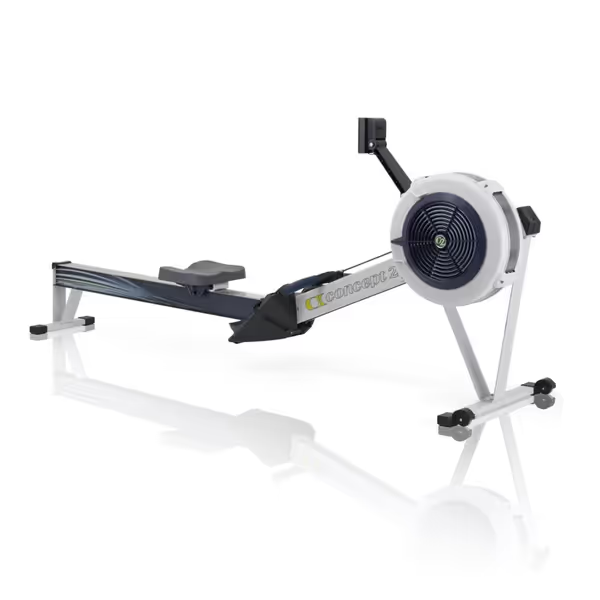
Concept2 RowErg Model D Indoor Rowing Machine
Key spatial advantages:
- Two-piece separation with tool-free framelock mechanism (stored dimensions: 54" x 33" x 25")
- Caster wheels that allow repositioning without lifting
- Vertical storage option when wall-mounted with third-party accessories
- Adjustable footrests that accommodate various inseam lengths within the same footprint
Performance considerations:
- Air resistance creates recognizable swooshing sound (65-75 dB range)
- Minimal vibration thanks to solid construction, reducing floor transmission
- 500-pound capacity accommodates diverse users without footprint expansion
For practitioners prioritizing authentic rowing mechanics over absolute quiet, the Model D earns respect for its space efficiency despite its length. The inclusion of posture-friendly cues in the PM5 monitor helps maintain proper form even in constrained environments where wall mirrors might not be feasible.
WaterRower Ash
The WaterRower Ash brings aesthetic appeal to the rowing experience with its handcrafted American hardwood construction, but how does it perform in tight quarters?
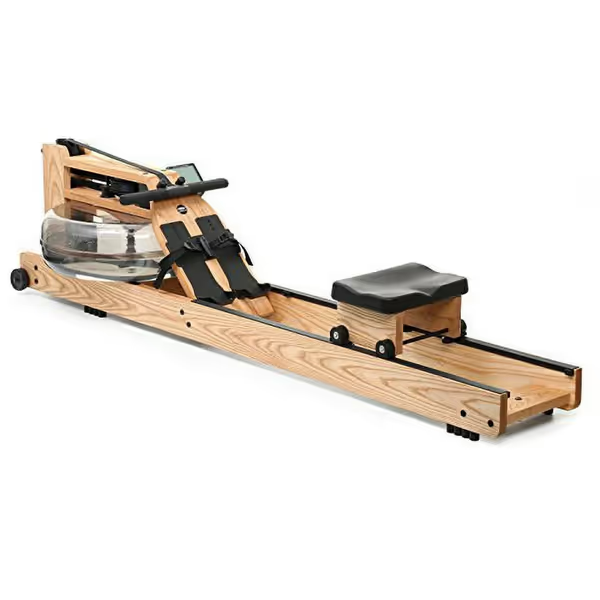
WaterRower Ash Rowing Machine
Space considerations:
- Footprint: 82" x 22" during use
- Storage: Can be stored vertically (requires 20" x 22" floor space)
- Weight: 103.5 lbs (with water), making vertical storage more challenging
Noise profile analysis:
- Consistent water resistance creates a soothing whoosh (60-70 dB)
- Minimal mechanical noise compared to air rowers
- No electrical components (monitor powered by rowing motion)
Where the WaterRower excels is in creating an environment that supports consistency through sensory design. The natural wood finish and rhythmic water sound transform the workout experience, making you want to return daily. In my assessment of storage density metrics, the vertical storage capability makes it viable for rooms where floor space must dual-purpose as living space during non-workout hours.
Sunny Health & Fitness SF-RW5801
Positioned as the entry point for budget-conscious buyers, the Sunny Health & Fitness magnetic rower delivers remarkable space efficiency for its price point.
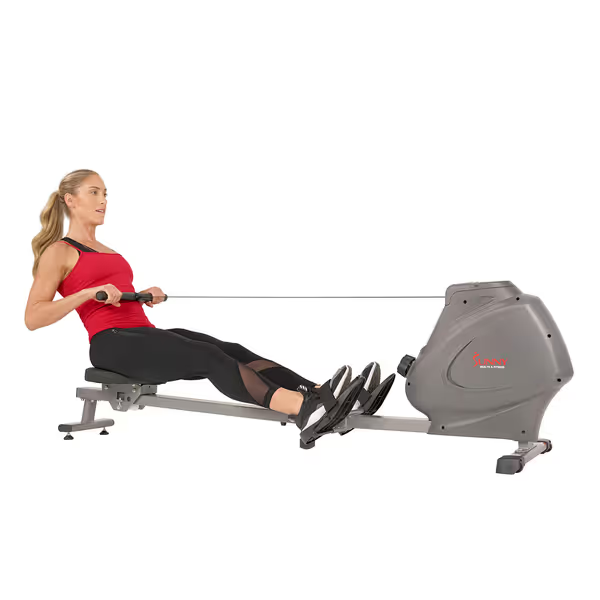
Sunny Health & Fitness Magnetic Rowing Machine
Spatial advantages:
- 77" length during use (shorter than most competitors)
- Folding mechanism reduces storage footprint to 36" x 23"
- Lightweight construction (50 lbs) enables easy repositioning
- 43" slide rail accommodates average inseams in minimal space
Noise performance:
- Magnetic resistance delivers quietest operation (50-60 dB)
- Minimal vibration transmission through frame
- No electrical motor noise (passive magnetic system)
The Sunny model shines for true space-constrained environments, particularly those with lower ceiling heights that limit vertical storage options. While its build quality doesn't match the premium models, the compact footprint and exceptionally quiet operation make it a strong contender for apartment dwellers weighing the magnetic vs air rower decision primarily through a space and noise lens.
Comparative Analysis: Space, Noise, and Integration
Space Efficiency Metrics
| Model | Use Dimensions (LxW) | Storage Dimensions | Vertical Storage | Weight |
|---|---|---|---|---|
| Concept2 Model D | 95" x 24" | 54" x 33" | Possible with accessory | 106 lbs |
| WaterRower Ash | 82" x 22" | 20" x 22" | Yes | 103.5 lbs |
| Sunny SF-RW5801 | 77" x 23" | 36" x 23" | No | 50 lbs |
Noise Profile Comparison
| Model | Max dB | Noise Type | Apartment Friendly | Vibration Transmission |
|---|---|---|---|---|
| Concept2 Model D | 75 | Air swoosh + mechanical | Moderate | Low |
| WaterRower Ash | 70 | Consistent whoosh | Good | Very low |
| Sunny SF-RW5801 | 60 | Near-silent | Excellent | Minimal |
Space Integration Considerations
- Apartment rower suitability: Sunny leads for noise-sensitive environments, WaterRower offers better sound quality for those who don't mind moderate noise
- Ceiling height conflicts: Sunny's shorter profile avoids issues in rooms with 7' ceilings where taller models might require angled positioning
- Storage density metrics: WaterRower's vertical storage option maximizes floor space recovery, while Sunny's folding design works better for rooms without wall clearance
- Posture-friendly cues: Concept2's PM5 provides best biomechanical feedback for technique refinement
Final Assessment: Matching Rowers to Space Constraints
For True Space-Saving Needs
If your priority is space saving cardio in the tightest possible footprint with minimal noise disruption, the Sunny Health & Fitness model represents the most sensible choice. It delivers the quietest operation and most compact folded dimensions of the three models reviewed. While premium features and build quality are understandably limited at this price point, the space efficiency makes it ideal for studio apartments, shared bedrooms, or environments where the equipment must completely disappear between uses.
For Noise-Quality Balance
For those who value the authentic rowing experience but still need to respect thin walls and sleeping family members, the WaterRower Ash offers the best compromise. Its consistent water sound is often perceived as more pleasant than mechanical alternatives, and the vertical storage capability maximizes living space recovery. The solid construction also minimizes vibration transmission through subfloors, a critical factor for apartment dwellers often overlooked in reviews.
For Performance-Oriented Users
The Concept2 Model D remains the choice for serious rowers who prioritize authentic resistance mechanics above all else. While its length challenges the most constrained spaces, the tool-free separation and casters make it surprisingly adaptable. Its noise profile falls between the other two options, making it workable for detached homes or dedicated gyms but potentially problematic for apartment living during quiet hours.
Final Verdict: Flow First for Sustainable Results
When selecting compact rower reviews for your space, remember that the quietest machine you'll use consistently beats the premium model that collects dust because it disrupts your living environment. I've seen too many clients invest in high-end equipment only to abandon it because it didn't respect their spatial or noise constraints.
The Sunny model earns our recommendation for the most space-constrained apartments where quiet operation is non-negotiable. Its compact dimensions, folding capability, and whisper-quiet magnetic resistance make it the true apartment rower solution. For environments where noise is less critical but space still matters, the WaterRower's vertical storage capability creates remarkable living space recovery. And for dedicated home gyms where performance takes priority over space constraints, the Concept2 delivers unmatched rowing authenticity.
Flow first: the space should invite training, not clutter. A rowing machine that fits your space and your lifestyle, rather than forcing you to adapt your life around it, creates the conditions for consistent, sustainable results. When your equipment disappears appropriately between sessions and operates without disrupting your household, you remove the barriers between intention and action. And that's the quietest path to progress.
Related Articles

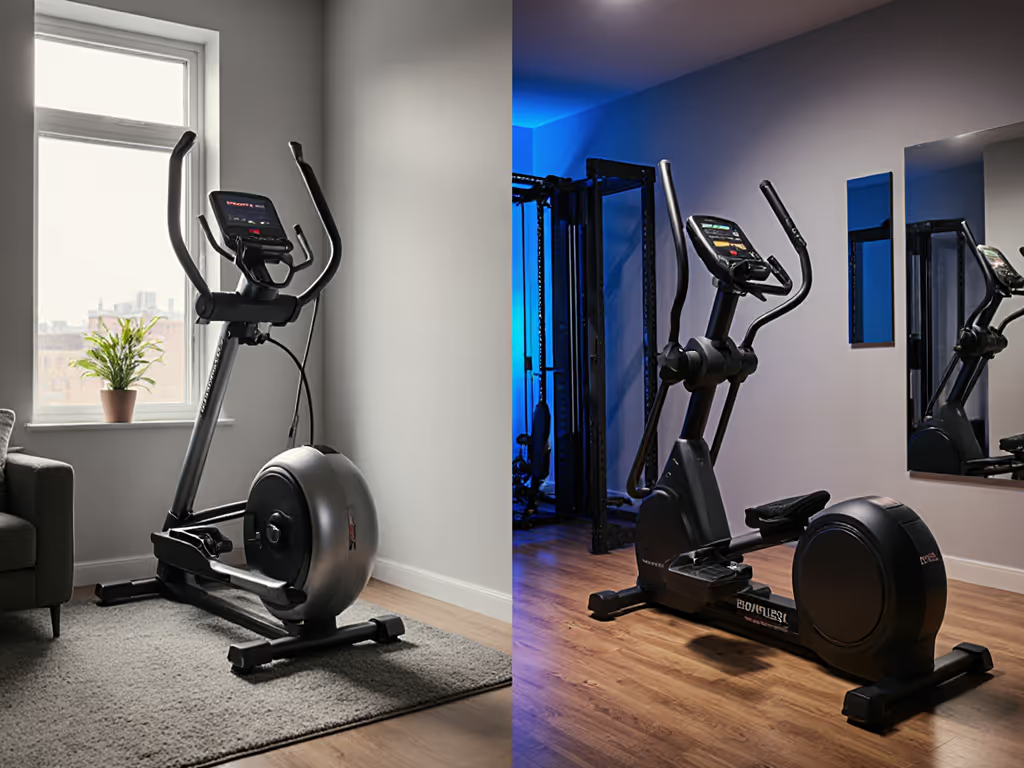
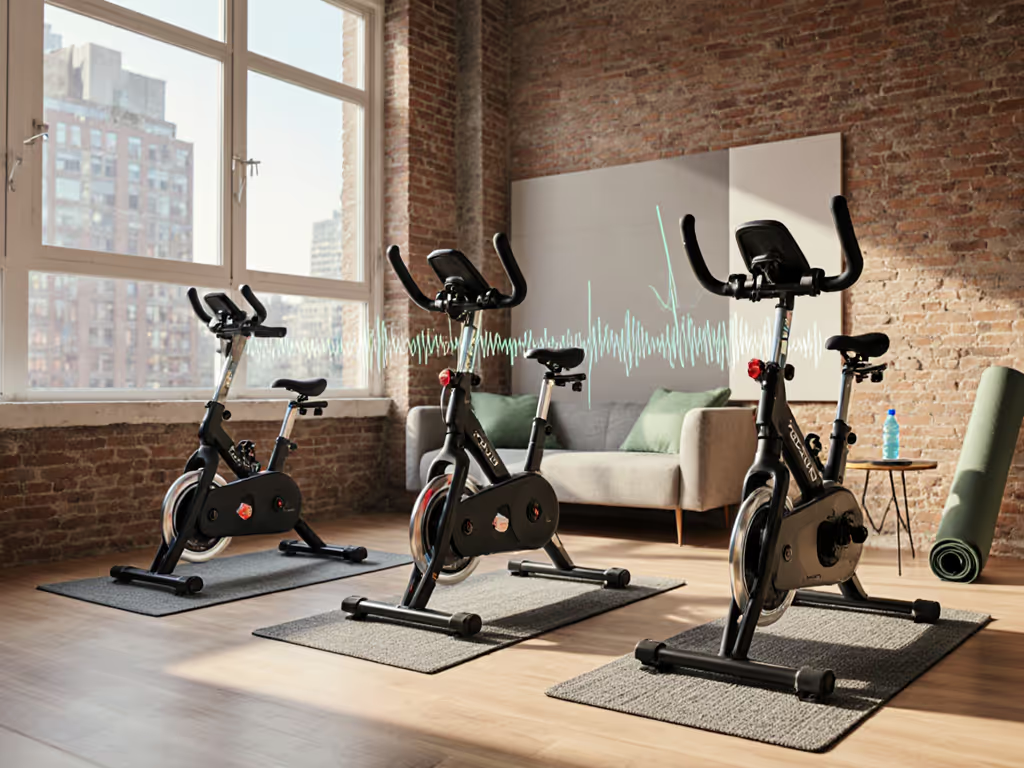
Peloton Alternatives: Quiet Apartment Bike Comparison
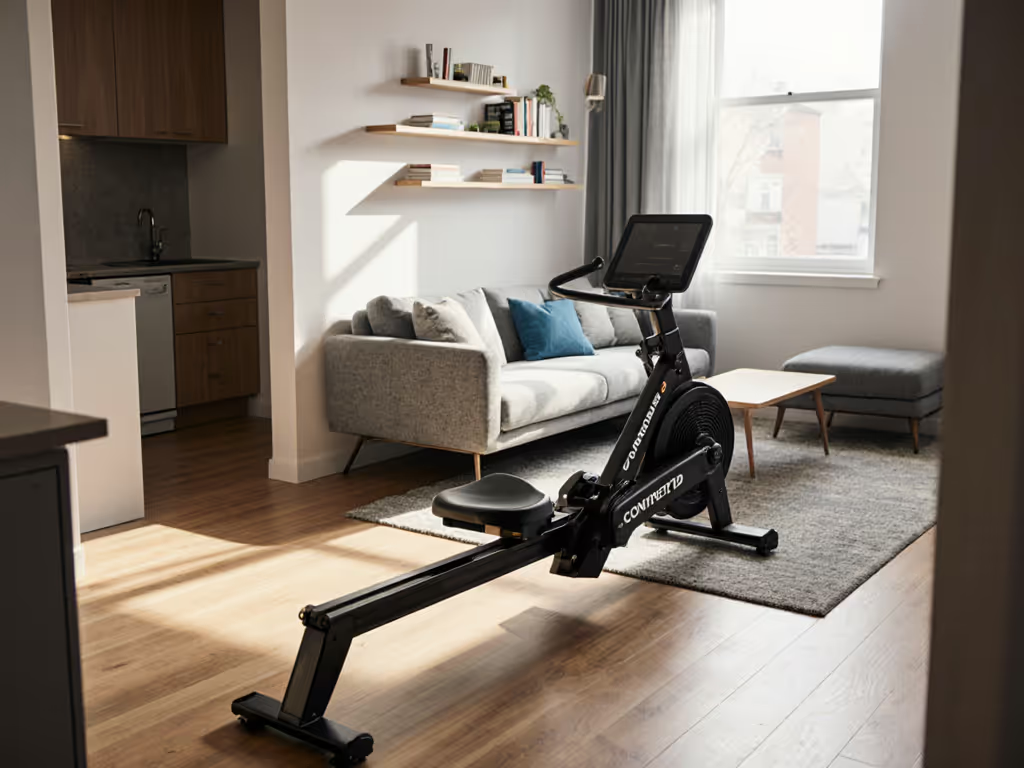
Concept2 Model D Review: Fits Small Spaces Quiet Enough for Home
